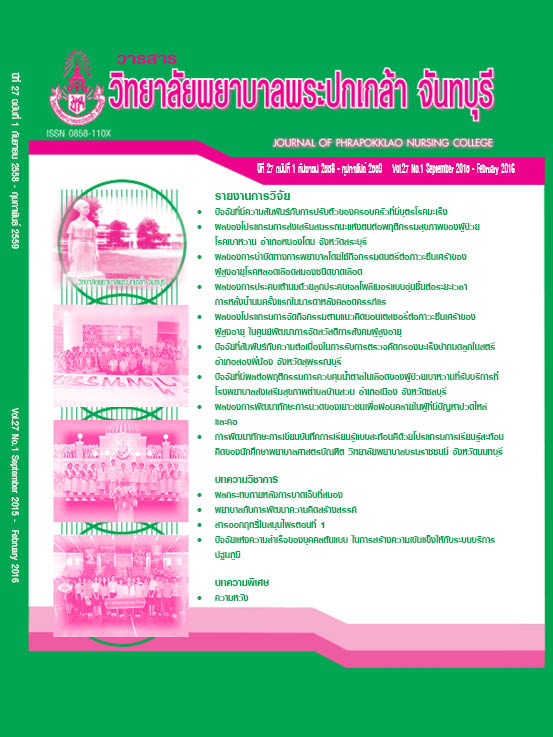The Effect of Therapeutic Nursing Intervention using Music Activities on Depression in Elderly Patients with Ischemic Stroke
Keywords:
Nursing therapeutic, Music activities, Depression, Elderly person, Ischemic strokeAbstract
The experimental research aimed to examine the effects of therapeutic nursing intervention using music activities on depression in elderly patients with ischemic stroke. Subjects consisted of 40 elderly patients with ischemic stroke with mild to moderate depression. They were equally divided into an experimental group and a control group, and were pair-matched by gender, age, levels of depression, and levels of activity daily living. Research instruments included the therapeutic nursing intervention using musical activities for depression among elderly patients with ischemic stroke; a record form of activity attendance; a demographic data questionnaire; Thai Geriatric Depression Scale with the reliability of .93, and Barthel Activities of Daily Living Index. The experimental group received the therapeutic nursing intervention using musical activities; whereas, the control group received regular nursing care. The intervention was implemented and the data were collected from June, 16 to August, 1, 2014. Data were analyzed using frequency, percentage, mean, standard deviation, paired t-test, and independent t-test.
Major findings were as follows: 1) for the experimental group, after the experiment, a mean score of depression was statistically significantly lower than that before the experiment (t = 15.274, p < .001); and 2) after the experiment, a mean score of depression of the experimental group was statistically significantly lower than that of the control group (t = 8.768, p < .001).
This study suggests that health care workers should be trained to provide holistic care for elderly patients with stroke and depression. Additionally, the therapeutic nursing intervention using musical activities should be appropriately applied to individual elderly patient with stroke and depression.
References
กลุ่มฟื้นฟูสมรรถภาพสมอง. (2537). แบบวัดความเศร้าในผู้สูงอายุของไทย. สารศิริราช, 46(1), 1-9.
จักรกริช กล้าผจญ. (2554). แนวทางการใช้ดนตรีบำบัดสำหรับผู้ป่วยและผู้พิการทางกาย พ.ศ. 2554. เชียงใหม่: กลุ่มดนตรีบำบัด ภาควิชาเวชศาสตร์ฟื้นฟู คณะแพทยศาสตร์ มหาวิทยาลัยเชียงใหม่.
ชนกพร จิตปัญญา. (2551). เอกสารประกอบการสอนเรื่อง การบำบัดทางการพยาบาล. กรุงเทพฯ: คณะพยาบาลศาสตร์ จุฬาลงกรณ์มหาวิทยาลัย.
ช่อผกา สุทธิพงศ์, และศิริอร สินธุ. (2555). ปัจจัยทำนายภาวะซึมเศร้าในผู้สูงอายุภายหลังเป็นโรคหลอดเลือดสมองในเขตชุมชนเมือง. วารสารพยาบาลศาสตร์, 30(1), 28-39.
นิพนธ์ พวงวรินทร์. (บ.ก.). (2544). โรคหลอดเลือดสมอง (พิมพ์ครั้งที่ 2). กรุงเทพฯ: โรงพิมพ์เรือนแก้วการพิมพ์.
สำนักการแพทย์ทางเลือก กรมพัฒนาการแพทย์แผนไทยและการแพทย์ทางเลือก กระทรวงสาธารณสุข. (2551). ดนตรีบำบัด. กรุงเทพฯ: สุขุมวิทมีเดียมาร์เก็ตติ้ง.
สุทธิชัย จิตะพันธ์กุล. (2541). หลักสำคัญของเวชศาสตร์ผู้สูงอายุ. กรุงเทพฯ: สาขาวิชาเวชศาสตร์ผู้สูงอายุและพฤฒาวิทยา ภาควิชาอายุรศาสตร์ คณะแพทยศาสตร์ จุฬาลงกรณ์มหาวิทยาลัย.
อวยพร เรืองตระกูล. (2550). สถิติประยุกต์ทางพฤติกรรมศาสตร์ I. กรุงเทพฯ: ภาควิชาวิจัยและจิตวิทยาการศึกษา คณะครุศาสตร์ จุฬาลงกรณ์มหาวิทยาลัย.
Davis, W. B., Gfeller, K. E., & Thaut, M. H. (1999). An introduction to music therapy: Theory and practice (2nd ed.). Boston, MA: McGraw-Hill.
de Man-van Ginkel, J. M., Gooskens, F., Schuurmans, M. J., Lindeman, E., Hafsteinsdottir, T. B. (2010). A systematic review of therapeutic interventions for poststroke depression and the role of nurses. Journal of Clinical Nursing, 19(23-24), 3274-3290.
Farrell, C. (2004). Poststroke depression in elderly patients. Dimensions of Critical Care Nursing, 23(6), 264-269.
Hackett, M. L., & Anderson, C. S. (2005). Treatment options for post-stroke depression in the elderly. Aging Health, 1(1), 95-105.
Hama, S., Yamashita, H., Yamawaki, S., & Kurisu, K. (2011). Post-stroke depression and apathy: Interactions between functional recovery, lesion location, and emotional response. Psychogeriatrics, 11(1), 68-76.
Hornsten, C., Molander, L., & Gustafson, Y. (2012). The prevalence of stroke and the association between stroke and depression among a very old population. Archives of Gerontology and Geriatrics, 55(3), 555-559.
Jun, E. M., Roh, Y. H., & Kim, M. J. (2013). The effect of music-movement therapy on physical and psychological states of stroke patients. Journal of Clinical Nursing, 22(1-2), 22-31.
Kim, D. S., et al. (2011). Effects of music therapy on mood in stroke patients. Yonsei Medical Journal, 52(6), 977-981.
Knight, A. J., & Wiese, N. (2011). Therapeutic music and nursing in poststroke rehabilitation. Rehabilitation Nursing, 36(5), 200-204, 215.
Lökk, J., & Delbari, A. (2010). Management of depression in elderly stroke patients. Neuropsychiatric Disease and Treatment, 6, 539-549.
Loubinoux, I., et al. (2012). Post-stroke depression: Mechanisms, translation and therapy. Journal of Cellular and Molecular Medicine, 16(9), 1961-1969.
Magee, W. L., & Baker, M. (2009). The use of music therapy in neuro-rehabilitation of people with acquired brain injury. British Journal of Neuroscience Nursing, 5(4), 150-156.
Magee, W. L., et al. (2006). Music therapy for patients with traumatic brain injury. In Murrey, G. J. (Ed.). Alternate therapies in the treatment of brain injury and neurobehavioral disorders: A practical guide. New York: The Haworth Press.
Ouimet, M. A., Primeau, F., & Cole, M. G. (2001). Psychosocial risk factors in poststroke depression: A systematic review. Canadian Journal of Psychiatry, 46(9), 819-828.
Paolucci, S. (2008). Epidemiology and treatment of post-stroke depression. Neuropsychiatric Disease and Treatment, 4(1), 145-154.
Pfeil, M., Gray, R., & Lindsay, B. (2009). Depression and stroke: A common but often unrecognized combination. British Journal of Nursing, 18(6), 365-369.
Särkämö, T., et al. (2008). Music listening enhances cognitive recovery and mood after middle cerebral artery stroke. Brain, 131(Pt 3), 866-876.
Särkämö, T., & Soto, D. (2012). Music listening after stroke: Beneficial effects and potential neural mechanisms. Annals of the New York Academy of Sciences, 1252(1), 266-281.
Whyte, E. M., & Mulsant, B. H. (2002). Post stroke depression: Epidemiology, pathophysiology, and biological treatment. Biological Psychiatry, 52(3), 253-264.
Downloads
Published
How to Cite
Issue
Section
License
Copyright (c) 2016 Journal of Phrapokklao Nursing College

This work is licensed under a Creative Commons Attribution-NonCommercial-NoDerivatives 4.0 International License.
เนื้อความ ข้อมูล และรายการอ้างอิงที่ผู้เขียนใช้ในการเขียนบทความเพื่อลงตีพิมพ์ในวารสารวิทยาลัยพยาบาลพระปกเกล้า จันทบุรี ถือเป็นความคิดเห็นและความรับผิดชอบของผู้เขียน คณะผู้จัดทำวารสารไม่จำเป็นต้องเห็นพ้องด้วยหรือร่วมรับผิดชอบ
บทความที่ได้รับการลงตีพิมพ์ในวารสารวิทยาลัยพยาบาลพระปกเกล้า จันทบุรี ถือเป็นลิขสิทธิ์ของวารสารวิทยาลัยพยาบาลพระปกเกล้า จันทบุรี หากหน่วยงานหรือบุคคลใดต้องการนำส่วนหนึ่งหรือทั้งหมดของบทความไปเผยแพร่ต่อเพื่อวัตถุประสงค์ใด ๆ จะต้องได้รับอนุญาตจากบรรณาธิการวารสารก่อน



